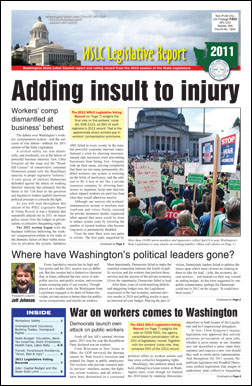STATE GOVERNMENT
Washington State Labor Council releases legislative scorecard
 SEATAC (Aug. 5) — In conjunction with Day 2 of its annual convention today, the state’s largest labor organization — the Washington State Labor Council, AFL-CIO — made public the 2011 edition of its Legislative Report and Voting Record. The publication (available online at wslc.org in HTML and PDF) summarizes this year’s legislative activity on working families issues and grades the performance of individual legislators.
SEATAC (Aug. 5) — In conjunction with Day 2 of its annual convention today, the state’s largest labor organization — the Washington State Labor Council, AFL-CIO — made public the 2011 edition of its Legislative Report and Voting Record. The publication (available online at wslc.org in HTML and PDF) summarizes this year’s legislative activity on working families issues and grades the performance of individual legislators.
The report is unusually critical of Democratic leadership, traditionally an ally of organized labor, describing several instances where critical safety nets were “drastically, and needlessly, cut at the behest of powerful business interests.” From regressive workers’ comp “reform” to privatization of public services, the report explains that the Republican caucuses were uniformly opposed to the interests of working families, but the Democratic majorities in both houses were conceded — and traditional Democratic values abandoned — as some self-proclaimed “moderate” Democrats chose corporate interests over workers.
The WSLC Voting Record (also available online at wslc.org) reflects the council’s disappointment with many Democrats, particular in the Senate where, taking a page from the Congressional Republicans, budget and jobs bills were held hostage to force through anti-labor legislation. A majority of Democratic state senators — 15 of 27 — scored 60% or less.
“This session had a distinctive character that, at times, reflected the new wave of anti-public service, anti-public worker, anti-revenue mania sweeping parts of our country,” wrote WSLC President Jeff Johnson in his column that appears in the publication. “Though played on a smaller scale, the Washington State Legislature engaged in its share of blame-the-victim, private-sector-is-better-than-the-public-sector comparisons, and attacks on workers. Most importantly, Democrats failed to make the essential connection between the health of public services and the workers that perform these services and the success of the private economy. Given the opportunity, Democrats failed to lead.”
Among the reports included in the WSLC’s 2011 Legislative Report and Voting Record are:
► Adding insult to injury — The 2011 session began with the business lobbyists bellowing for workers’ compensation reform in the wake of the dramatic failure of their ballot initiative to privatize the system. In the end — with the help of Gov. Chris Gregoire, Senate Democratic leadership, and ultimately, House Democratic leadership, the end result was HB 2123. Like the 2003 Unemployment Insurance benefit cuts — also done at Boeing’s behest — the final package was rammed through in the waning hours of the special session with no public hearing. It fundamentally changes our public system by allowing buyouts of injured workers.
► War on workers comes to Washington — At Gov. Gregoire’s request, legislation was approved that actively promotes privatization of state jobs, whether it saves money or not. Another new law decertified a union (state ferry captains) and requires a new vote should they seek to retain union representation. And throughout the 2011 session, Republican legislators and Roadkill Democrats pushed legislation that sought to undermine state collective bargaining agreements in order to impose bigger and bigger pay and benefit cuts upon public employees.
► Big tax cuts for business; temporary relief for jobless — HB 1091 set the tone for the 2011 session. The first bill out of the legislative gate, it was indicative of what was to come as the governor and the Legislature made addressing the business community’s concerns their first priority while skimping on assistance to the victims of Wall Street’s recession: families struggling with unemployment.
► Education needs more than words (column by WSLC Secretary-Treasurer Lynne Dodson) — The next two years will see more crowded classes at all levels, inadequate and demoralizing pay for educators, higher tuition, and fewer resources for our students. Clearly, if we want a quality public education system in Washington, we’ll have to demand it from our legislators.
In addition, there are several articles describing the fate of legislation affecting workplace safety, health care, public transit, the capital budget, and more. See the Legislative Report’s table of contents for a list.
Widely considered to be the “voice of labor” in our state, the Washington State Labor Council is the largest labor organization in the state with more than 500 affiliated local unions, representing more than 400,000 rank-and-file union members working in our state. Learn more at wslc.org.





